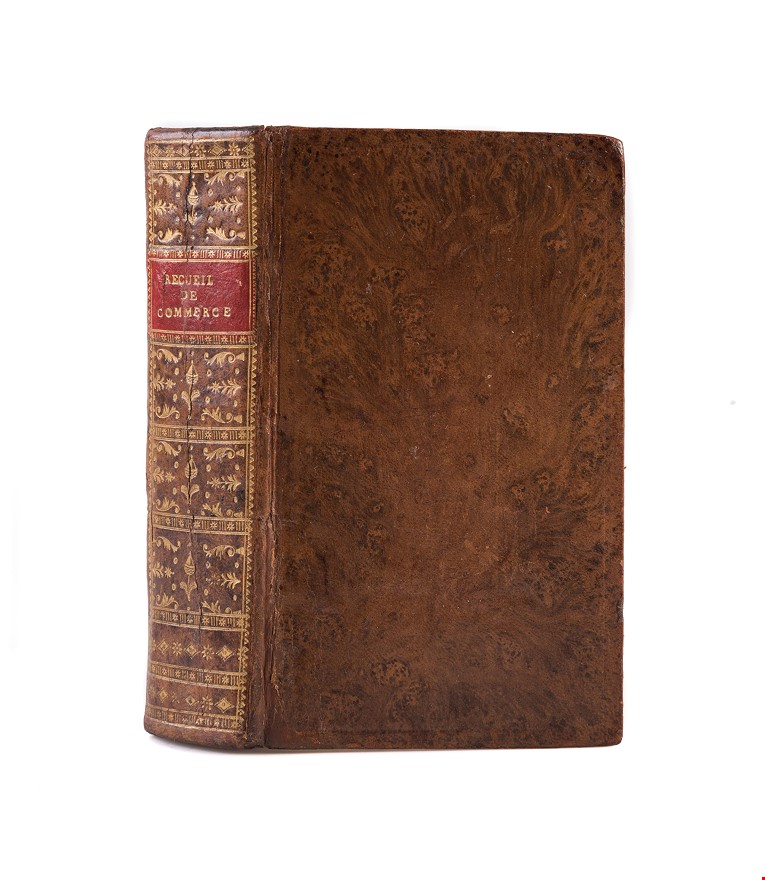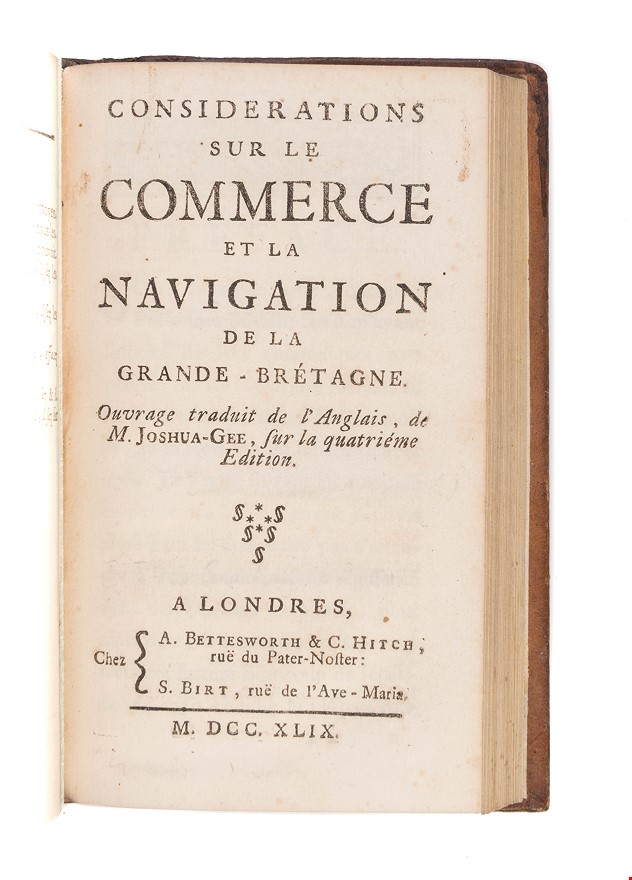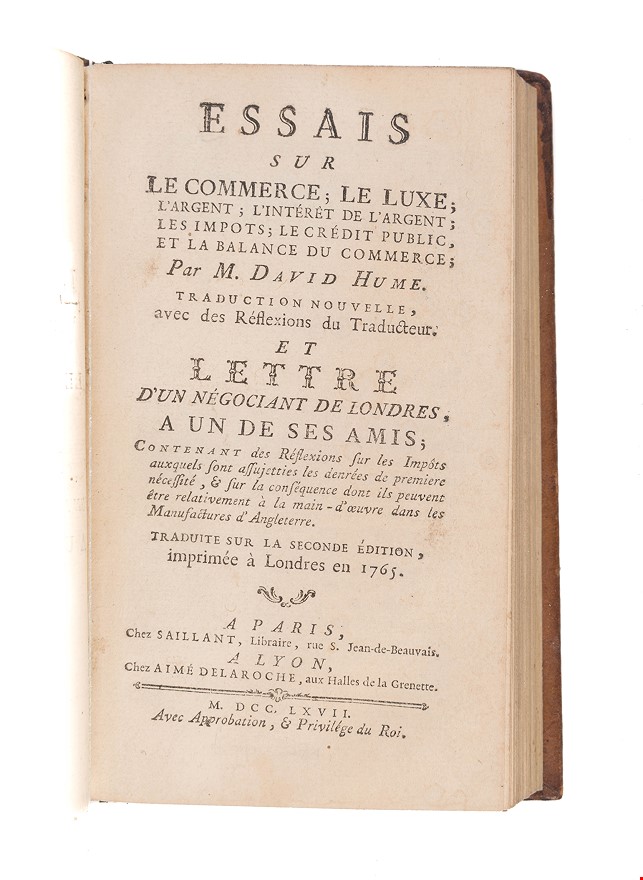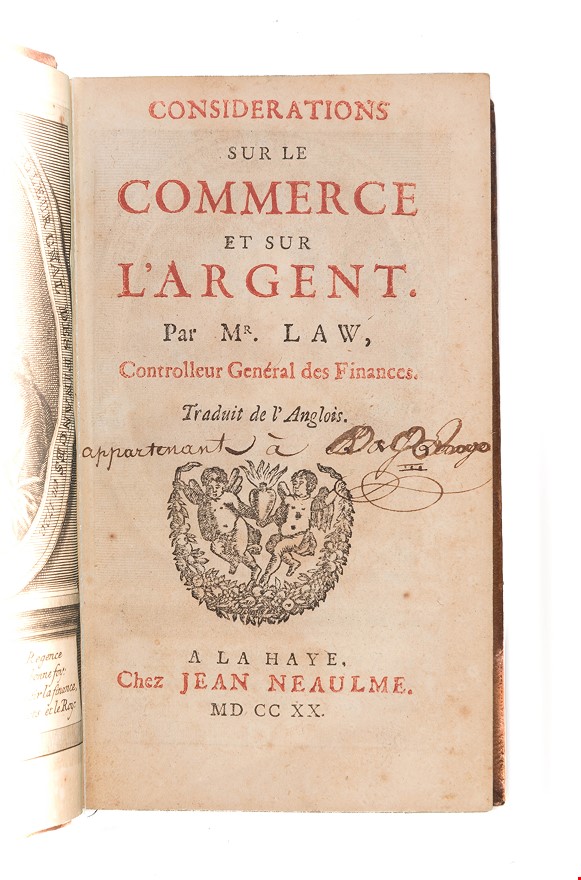Considerations sur le commerce et sur l'argent.
LAW John.; HUME David.; GEE Joshua (1720, 1767, 1749.)
£7500.00 [First Edition]
Please contact us in advance if you would like to view this book at our Curzon Street shop.
A SAMMELBAND OF THREE IMPORTANT WORKS OF EIGHTEENTH CENTURY BRITISH ECONOMICS, IN FRENCH TRANSLATION.
Par Mr. Law, controlleur genéral des finances. Traduit de l'anglois.
First edition in French. 8vo (168 x 100mm). [4]ff, 187, [17] pp., frontispiece portrait, title printed in red and black. Contemporary tree calf, covers with single blind fillet borders, spine divided into compartments by gilt rolls, the second lettered in gilt on red morocco label, the rest with elaborate gilt tooling (some discreet repair work to the spine and front and rear joints, otherwise an excellent copy. A La Haye, Jean Neaulme. 1720.
[bound with:] HUME (David). Essais sur le commerce; le luxe; l'argent; l'intéret de l'argent; les impots; le crédit public, et la balance du commerce. Trad. nouvelle, avec des réflexions du traducteur (Mlle. de la Chaux). Et lettre d'un négociant de Londres, à un de ses amis.
Third edition in French. 8vo. [2], 288, [4] pp. Engraved head and tail pieces. Paris, Saillant, & Lyon, Delaroche, 1767.
[bound with:] GEE (Joshua). Considérations sur le commerce et la navigation de la Grande-Brétagne. Ouvrage trad. de l'anglais (par J. B. de Secondat).
First edition in French. 8vo. [28], 268 pp. London [i.e. Paris or Trévoux], A. Bettesworth & C. Hitch, rue du Pater-Noster: S. Birt, rue de l’Ave-Maria. 1749.
A sammelband of three important - though in some areas conflicting - studies of commercial, economic and monetary theory by the foremost thinkers of eighteenth-century British economics, in French translation. Comprising the first edition in French of John Law’s Money and Trade Consider’d; the third French edition of Hume’s essays on finance and economics, taken from his Political Discourses (1752); and the first French edition of Joshua Gee’s The Trade and Navigation of Great Britain Consider’d (1729).
John Law's most important - and infamous - work of monetary theory, first published in Scotland in 1705, proposes a system of paper money backed by land, which, Law argues, is more stable than the comparably more volatile and less predictable silver and gold. "The central thrust in his argument was that an expansion in the money supply would lead to an expansion in output" (ODNB). Though rejected by the Scottish government, Law received permission to implement elements of his plan in France in 1716, in particular, the issuing of paper credit as part of an attempt to relieve the national debt through investment schemes. Publication of this first French translation of Law's proposal is conspicuous in its timing. The same year, 1720 saw the collapse of his so-called 'System' - the Mississippi Bubble - with ruinous consequences for the French economy: unprecedented speculation, hyperinflation, a stock market crash, and subsequently high taxation, following the state's absorption of Law's debt. Law is referred to on the title page here as 'Controlleur Géneral des Finances', a position he held from 5 January 1720 until temporary dismissal on 27 May following the first of his scheme's crises (though reappointed, dismissal became permanent on 9 December). This indicates that publication took place early in the year when his scheme still appeared to be watertight, and public opinion in France was buoyant.
The collection of Hume's writings that follow contains the seven essays on finance and economics from his Political Discourses, first published in 1752. By the time that this third edition was published Hume enjoyed great repute in France both as historian and philosopher; on his arrival in 1763 to assist the British ambassador he received 'an official and personal welcome such as few foreign authors have ever received in the French capital' (Bongie, xxiv). Although not the explicit laying out of a systematic economic theory, these essays have been described as 'the beginnings of modern monetary theory' (Lucas); 'when asked what economists had learned about monetary theory in the past 25 years, Milton Friedman replied that the better question would be to ask what had been learned in the 200 years since Hume. The answer is very little, he concluded' (Schabas & Wennerlind). These essays contain Hume's most famous economic proposals, including his rejection of a mercantilist approach to trade, and his related theory of price-specie flow mechanism. The juxtaposition of Hume's work with Law's is, though not unusual, an interesting one; Hume firmly believed in a currency backed by gold or precious metals and, in contrast to Law, was sceptical about the issuance of paper notes. Indeed, Hume obliquely refers to Law in his essay on Public Credit, here, as an example of the wrong way to address national debt: 'when the nation becomes heartily sick of their debts, and is cruelly oppressed by them, some daring projector may arise with visionary schemes for their discharge. And as public credit will begin, by that time, to be a little frail, the least touch will destroy it as happened in France in 1720: much like the patient who dies from his doctor's remedy' (p. 166).
The final work in this sammelband, the first French edition of Gee's The Trade and Navigation of Great Britain Consider'd, lays out Gee's staunchly protectionist approach to British commerce. 'Gee's most famous work presented an overview of British trade both historically and by national areas, and commented on specific problems (for example devoting Chapter XXII to 'French fashions pernicious to England')' (ODNB). Both Hume and Adam Smith poked fun at Gee's writing for his sensationalism, Hume attributing to him 'universal panic' at the picture he painted of the national debt. Despite this, Gee's work was well-known and widely translated, with around twenty editions published before 1780.
Provenance: Nineteenth-century ownership inscription at head of flyleaf, 'Louis Curvalle', with note in Spanish 'de las cosas mas seguras la mas segura es dudan', from Simon Bolivar. 'Table de recueil' noted on verso of front flyleaf and on rear pastedown in different hand.
Law: Carpenter IX (4); Einaudi, 3274; Goldsmiths', 5820; Kress 3235.
Hume: Fieser 10(E.5); Goldsmiths' 10267; Higgs, 3971; Jessop, p. 25.
Gee: Goldsmiths', 8382; Einaudi, 2424; Sabin, 26828; Menger c. 452.
Bongie, David Hume: Prophet of the Counter Revolutions (1965), xxiv. R. Lucas cited in M. Schabas & C. Wennerlind, 'Retrospectives: Hume on Money, Commerce, and the Science of Economics', Journal of Economic Perspectives, 25, 217-30.
Stock Code: 231057







